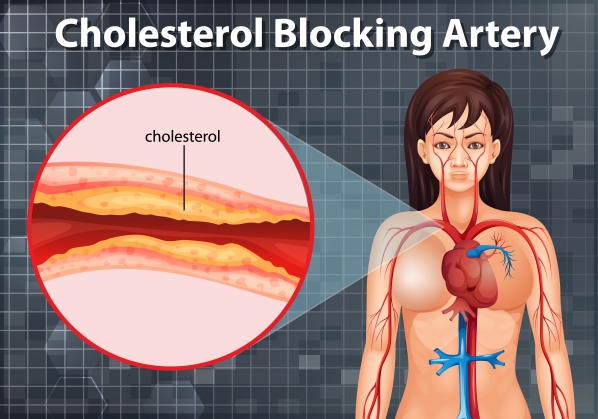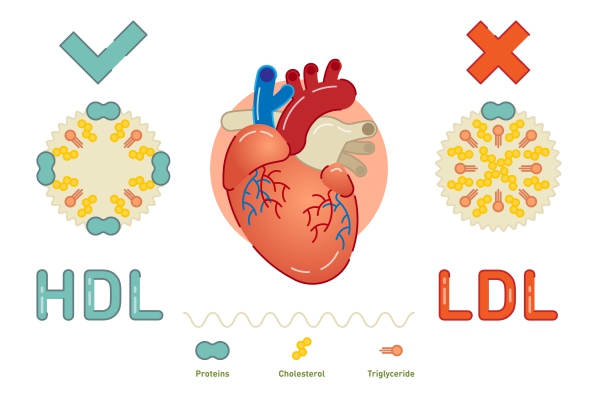What is Hyperlipidemia?
Hyperlipidemia, or most commonly known as “high cholesterol”, is the medical term used to describe a problem where there is an excessive amount of fats (lipids) in your blood. There are several disorders or causes that can result in this abnormally high amount, some of which can be controlled. The two types of fats that can be found in the circulating blood are triglycerides and cholesterol. They both come from consumption of fatty foods such as dairy products, red meat, or eggs. Even if it is most likely to be a lifelong condition, it is treatable. If left untreated, hyperlipidemia can lead to several complications such as heart diseases and other serious conditions. Once you are diagnosed with hyperlipidemia, you will be required to bring about lifestyle changes and you might also be needing medications in order to decrease the likelihood of ending up having complications.
Hyperlipidemia is a problem of an excessive amount of fats (lipids) in your blood, it can lead to a heart diseases and other serious conditions
Causes of Hyperlipidemia
Cholesterol comes from what you eat. The more you eat foods that are high in cholesterol, the higher the level in your blood. These are found in high amounts in:
- Egg yolk
- Pastries
- Milk and dairy products
- Processed meats
- Processed vegetable oils
- Butter
- Fried foods
- Ice cream
- Alcohol
- Red meat

Lack of exercise and increasing age also contributes to hyperlipidemia. Even if hyperlipidemia can be inherited to some degree (run in families), it is most commonly acquired due to an unhealthy lifestyle.
Some medical conditions can lead to high cholesterol levels such as liver diseases, diabetes, underactive thyroid, kidney disease, pregnancy and polycystic ovary syndrome amongst others.
Some medications can also lead to an increase in cholesterol in the blood such as diuretics, glucocorticoids, immunosuppressant and oral contraceptives.
Signs and symptoms of hyperlipidemia
Usually, if a person has hyperlipidemia, he/she would not know as it does not cause any symptoms. The person may have symptoms if the condition is advanced enough to cause complications. Cholesterol is a substance than can come together to form a plaque on a blood vessel wall, slowly clogging the artery as it becomes bigger. The narrowing of blood vessel can result in high blood pressure since blood can no longer pass through the blood vessel easily. Once the artery is completely blocked, the person ends up having heart disease or heart attack. Furthermore, blood can clot on the plaques. These clots can then break off and travel all the way to the heart or to the brain hence causing stroke.


Making a diagnosis
Since hyperlipidemia does not have any symptoms, only blood tests can confirm if you have it or not. This blood test is called a lipid profile. It is obtained by taking a sample of blood and sending it to the laboratory to check for the levels of cholesterol mainly:
- LDL (low-density lipoprotein) cholesterol which is the “bad” cholesterol causing formation of plaques in arteries
- HDL (high-density lipoprotein) cholesterol which is actually a “good” cholesterol that prevents the occurrence of heart disease
- Triglycerides which is another type of fat in which your body converts any excess calorie it does not need right away into
- Total cholesterol which is a sum of all of the above
Your doctor may ask you to fast (no eating or drinking; except for water) for about 8 to 12 hours prior to the test.
LDL cholesterol is what will actually build up in your arteries while HDL cholesterol is what will remove LDL cholesterol from the arteries and send it back to the liver. Hence, having too much LDL cholesterol and not enough HDL cholesterol is what causes hyperlipidemia.
The test is considered to be abnormally high if your total cholesterol levels exceeds 200 milligrams per decilitre. However, this varies from person to person and other factors should be taken into consideration to know if the result of the test is truly abnormal and what the next step is. These factors include the person’s age, current health problems, whether the patient is a smoker or whether the patient has a close family member who has heart problems. This will be best worked up by your doctor.

It is also recommended that adults aged more than 20 years old should have their cholesterol checked approximately every 4 years.
Treatment of hyperlipidemia
Treatment of hyperlipidemia starts with changes in your lifestyle whether it is inherited or acquired. Sometimes, change in lifestyle alone may not be enough to decrease the risk of developing complications such as heart attack or stroke. In some cases, your doctor may need to prescribe you some medications, however, in combination with lifestyle changes, this will result in better decrease in cholesterol.
Diet change
This is the first step in managing hyperlipidemia. The aim is to decrease LDL cholesterol and increase HDL cholesterol in your blood. An easy way to do so is to eat more of healthy fats and avoid saturated fats. These ‘bad’ fats are found in processed meat, red meat and dairy products high in fats. A healthy change would be to switch to lean protein such as poultry, turkey and fish. Choose dairy products which are fat free or low in fat. Use of olive oil or canola oil for cooking purposes can also be beneficial. Avoid fried foods and pastries as much as possible. Increase your intake of Omega-3 fatty acids which can be found in salmon or mackerel. Increase your intake in fibres as this can help to lower the ‘bad’ cholesterol levels. Eating more fruits and vegetables is also recommended. Avoid drinking alcohol as this may lead to an increase in cholesterol levels.

Loss of weight
Weight loss is important to decrease cholesterol levels in your blood especially if you are overweight or obese. A way to achieve this is to cut down the amount of calories you eat per day. You will achieve better results if done in combination with exercise as you will be burning more calories than what you are consuming. This will inevitably result in weight loss. Cutting down sugary foods or drinks also help in decreasing your calorie intake as these contain a lot of unnecessary calories.
Physical activity
When you have a sedentary lifestyle, that is you are not exercising enough, the levels of your good cholesterol decreases in your blood. You need to get into the good habit of including some exercise in your daily life. It is recommended to have about 40 minutes of moderate to vigorous exercise three to four times weekly. Cycling, brisk walking and swimming are good exercises to include into your schedule. Simple changes such as taking the stairs instead of the elevator whenever possible can also impact on your general health.
Stop smoking
It is strongly recommended to stop smoking as this contributes in having heart diseases. This issue should be addressed with your doctor who will then advise you on smoking cessation strategies.
Hyperlipidemia medications

As mentioned earlier, lifestyle changes may not be enough to lower cholesterol in some cases. Your doctor may then find it necessary to prescribe cholesterol-lowering and triglyceride-lowering medications. These include:
- Statins: These drugs work by preventing the liver from making cholesterol.
E.g. atorvastatin, fluvastatin, lovastatin, pivavastatin, simvastatin.
- Bile-acid-binding resins: Bile is an acid which is involved in digestion. These drugs bind to bile acids preventing them from doing their job. Your liver responds by making more bile, and to do so, it needs to use up the cholesterol found in your bloodstream. This is thus a way to trick your body to decrease the amount of cholesterol in your blood.
E.g. cholestyramine, colesevelam, colestipol.
- Cholesterol absorption inhibitors: They act by preventing absorption of cholesterol from foods you eat. E.g. asezetimibe
- Injectable medications : E.g. alirocumab, evolocumab
- Fibrates: These drugs lower triglyceride levels in the blood by accelerating its removal from the body. E.g. fenofibrate, gemfibrozil
- Niacin: This drug causes a decrease in the amount of triglycerides made from the liver.
- Omega-3 fatty acids supplements
Prevention of hyperlipidemia
Prevention is better than cure and there are several ways to decrease your risk of having hyperlipidemia later in life. These measures include:

- Regular exercise
- Decrease consumption of unhealthy fats (saturated fats)
- Increase consumption of fruits, vegetables, nuts, whole grains, oats and fish. The Mediterranean diet can be considered as a healthy eating plan.
- Avoid consumption of red meat and processed foods.
- Aim for a healthy weight.
- Switch to healthy fats such as olive oil, canola oil, or avocado oil
- Consume dairy products that are low in fat or fat free.

Source:
J. Alastair, I. and Simon, M., 2016. Davidson's Essentials of Medicine. 2nd ed. London: ELSEVIER.
Parveen, K. and Michael, C., 2017. Kumar & Clarks Clinical Medicine. 9th ed. The Netherlands: ELSEVIER.


